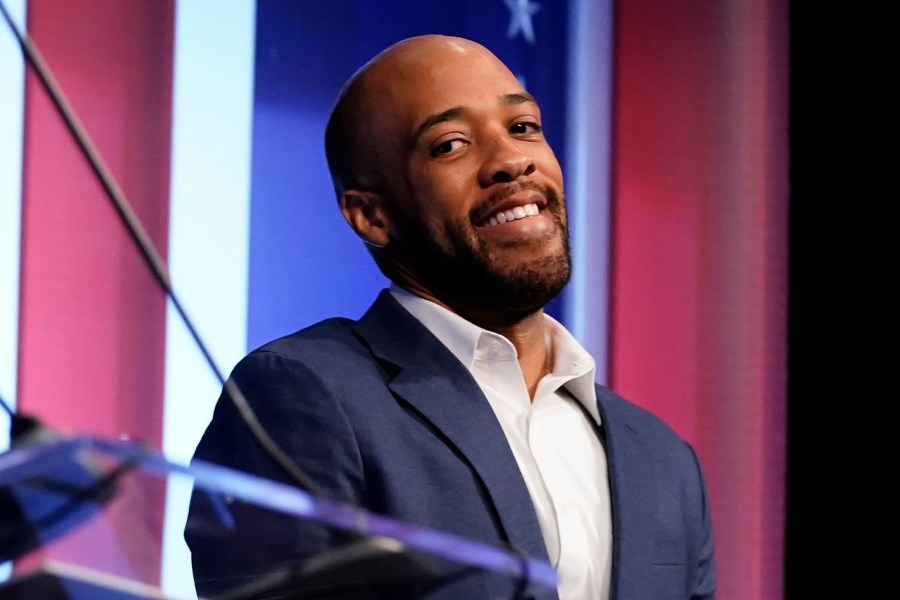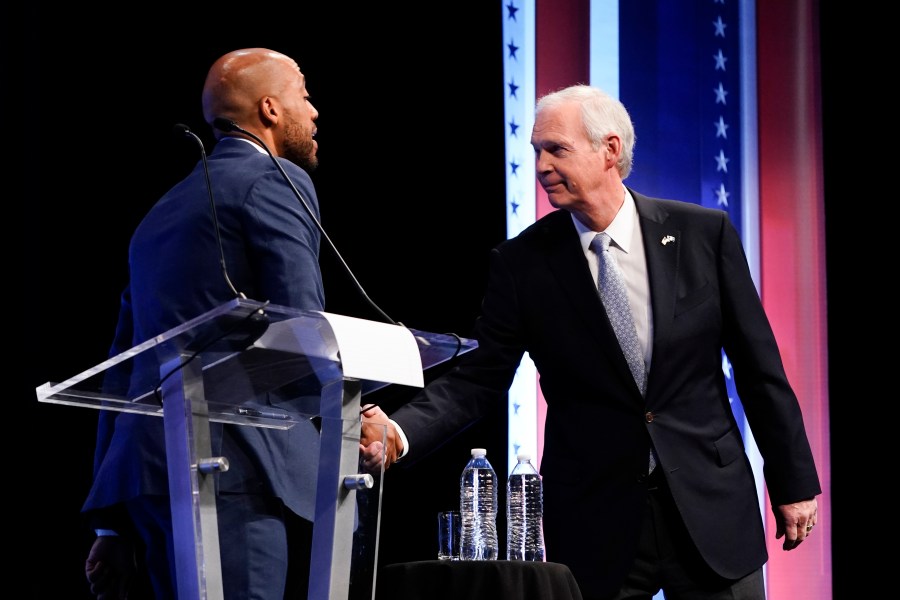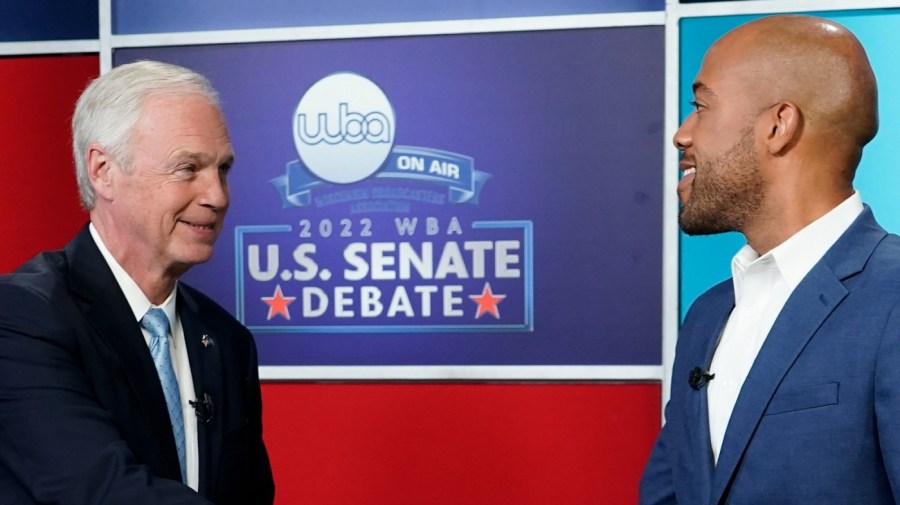Democrats relish chance to knock off Ron Johnson, but their odds look long
For the third time in roughly 12 years, Democrats are watching their chances of defeating Sen. Ron Johnson (R) slip away in Wisconsin, a state that otherwise has a strong track record of voting for Democrats.
Political handicappers are giving Democratic candidate Mandela Barnes, the state’s lieutenant governor, less chance of winning than challengers in the top-tier Senate races in Georgia, Nevada and Pennsylvania — an acknowledgement that Johnson, the stalwart conservative who was first elected to Congress as a Tea Party outsider, is likely to win again.
Speaking at the University of Wisconsin-Madison last week, Nate Silver of FiveThirtyEight, a leading handicapper, told an audience that the Wisconsin Senate contest ranks behind Arizona, Georgia, Nevada and Pennsylvania in competitiveness. He gives Barnes only a 24 in 100 chance of beating Johnson.
Yet Democrats hope they can drive enough young and base Democratic voters to the polls to defeat Johnson, who one GOP strategist conceded has seen his steady lead narrow in recent days.
In a sign that Democrats haven’t given up hope, former President Obama — one of the party’s top draws — held a rally for Barnes in Milwaukee over the weekend.
Republican National Committee Chairwoman Ronna McDaniel campaigned for Johnson the day before, helping him start a 10-day, 60-stop bus tour and signaling it remains a top-tier race to party leaders.
Defeating Johnson would be a major coup for Democrats, as he is expected to play a leading role in investigating the Biden administration if Republicans win back the Senate, which would be more likely if he wins reelection.
Johnson is set to take over as chairman of the Senate’s Permanent Subcommittee on Investigations under a GOP majority and vowed last week to be “like a mosquito in a nudist colony.”
“It would be a target-rich environment,” he told WISN’s “Upfront” in an interview published Monday. “I think we need to take a look at what happened with the miserable, failed response to COVID.”
“We’ve seen horrible corruption within the FBI, I would say partisanship within the Department of Justice. I think we need to find out more about that,” he added, signaling that he would take a leading role in Senate investigations of the Biden administration.
Democrats were optimistic of their chances of beating Johnson in early September, when Barnes had a solid 5-point lead in the RealClearPolitics average of public polls.

Democratic U.S. Senate candidate Mandela Barnes.
But Johnson has since passed Barnes in public polling, and Senate Republican strategists feel confident he will hang on to win.
A poll of 1,376 likely voters conducted from Oct. 14 to Oct. 22 by Data for Progress, a left-leaning group, showed Johnson with a 5-point lead. It represented a 3-point improvement for Johnson compared to a Data for Progress poll conducted from Sept. 20 to Sept. 22, which showed Johnson leading Barnes 50 percent to 48 percent.
A CNN poll of 714 likely voters conducted from Oct. 13 to Oct. 17, however, showed Johnson with only a 1-point lead.
Democrats thought Johnson’s surprise victory over former Sen. Russ Feingold (D-Wis.), a prominent incumbent who co-authored the landmark McCain-Feingold campaign finance reform law, in 2010 was a fluke made possible by the Tea Party wave of that year’s midterm election.
And Democrats thought they had him beaten in a 2016 rematch with Feingold when the Senate Leadership Fund, a super PAC aligned with Senate Minority Leader Mitch McConnell (R-Ky.), shifted its attention to GOP candidates in New Hampshire and Pennsylvania.
The National Republican Senatorial Committee canceled plans in 2016 to spend $800,000 in the final weeks of the campaign, reflecting the conventional wisdom in Washington at the time that Hillary Clinton would win the state and carry the Senate race with her.
Now Johnson is the clear front-runner heading into the final week before Election Day.

Republican U.S. Senate candidate Ron Johnson, right, and Democratic U.S. Senate candidate Mandela Barnes.
But a Senate Republican strategist acknowledged the race has tightened in the past week.
“It’s closer now than it was a week ago. Maybe that’s Democrats coming home” to Barnes, said the Senate GOP adviser.
The GOP source predicted the late surge won’t be enough to swing the race to Barnes.
The Democratic candidate has seen his approval rating drop to the mid-40s after Republican and GOP-allied groups pummeled him with television ads attacking his record and past statements as soft on crime.
“Ron John, he’s going to win,” the Republican adviser said, predicting the Democrats’ heavy reliance on hitting Johnson over abortion rights won’t move many undecided voters at this point.
“No undecided voter is picking their candidate based on abortion at this point. If you care about abortion, you already know your horse,” the source added.
Democrats, meanwhile, hope that the Supreme Court’s decision in Dobbs v. Jackson Women’s Health Organization, which struck down the right to an abortion established in 1973 by Roe v. Wade, will drive new voters to the polls, especially young women.
Joe Zepecki, a Wisconsin-based Democratic strategist, noted that Wisconsin allows voters to register at polling locations on Election Day, which could open the door to a surge in new voters who are not being captured by surveys conducted so far.
Zepecki thinks same-day voter registration made it easier for new voters to cast ballots for former President Trump in 2016, helping him steal the state from Hillary Clinton, something that few pollsters expected ahead of Election Day six years ago.
“What we do here is close elections,” he said of the even divide between Democrats, Republicans and independents who lean toward either party in the state.
“With same-day registration and without partisan registration in this state, there’s more likelihood than in other states that you just don’t see stuff until you see stuff. That’s kind of what happened in 2016 where Trump was able to activate a new part of the electorate,” he said.
Zepecki said that Democratic-allied groups appear to have caught up to their Republican counterparts in spending and putting ads on the air.

Republican U.S. Senate candidate Ron Johnson, right, and Democratic U.S. Senate candidate Mandela Barnes.
“I get the sense that they’re at parity,” he said.
“The spending story in this race is there were a couple of weeks where the blue team was getting outspent and outpointed and that has shifted throughout the month of October where the blue team has had as many or more points [worth of television advertising] and as many or more dollars,” he added, referring to Democratic-allied groups.
Barnes reported raising $8.16 million in net contributions in his pre-general election report spanning Oct. 1 to Oct. 19, significantly more than the $2.6 million Johnson reported collecting during the same time.
He said it was crucial for Barnes and Democrats to catch up with Johnson and his allies on the airwaves now “when the lowest-information voters who care about politics now understand that it’s the time to make a plan and go vote and figure out who to vote for.”
Republican strategists, however, say that Democrats are grasping at straws by hoping a late surge of new voters will help Barnes close the polling gap with Johnson.
Brandon Scholz, a Wisconsin-based Republican strategist, said Johnson’s lead over Barnes is “relatively locked into place.”
“You’ve seen Johnson move from the behind position that he was in after the primary to maintaining a couple-of-points lead,” he said. “The reason is that he got a jump on Mandela on the crime issue and pushed him hard.”
He said Democrats have responded to the soft-on-crime attacks on Barnes by running an ad on abortion but didn’t get much traction with independents in the polls.
With relatively few undecided voters up for grabs, both candidates are doubling down on trying to motivate their respective parties’ bases.
“Barnes and Johnson too are playing to their bases more than anything else. Testament to that is Obama in town this past weekend,” he said.
Wisconsin Gov. Tony Evers (D) is also up for reelection and has a razor-thin lead in the RealClearPolitics polling average — half a point. Strategists say that’s not a big enough margin to help Barnes down ballot.
“It’s all about base turnout,” Scholz said. “Wisconsin is a very red-blue state. There’s no purple. Independents make up their minds quickly post-primary. Any competitive race at the top of the ticket is going to be determined by a point or 2.”
“If Johnson gets a 3- or 4-point victory, that would be like a runaway, a landslide,” he said.
Copyright 2023 Nexstar Media Inc. All rights reserved. This material may not be published, broadcast, rewritten, or redistributed. Regular the hill posts







